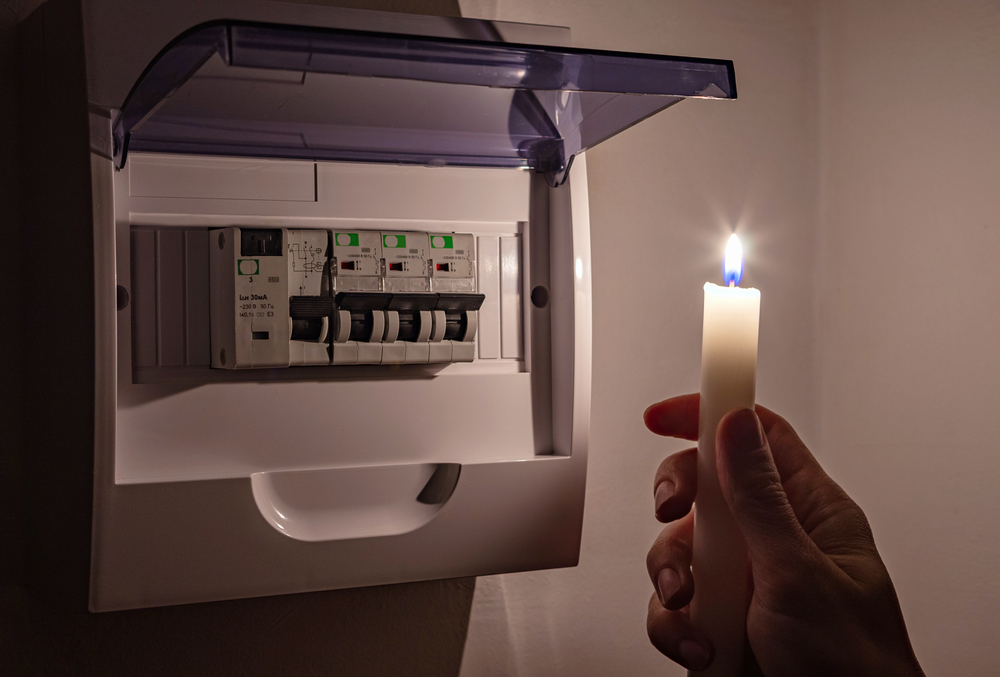As the entire world revolves around electricity, one of the most fundamental necessities in life is power — as well as a house generator for power outages. We power our internet, homes, and offices, and many of us are increasingly doing it with the most recent technology to run our automobiles.
But as valuable as power is, it can be easily lost. A variety of things can happen that disrupt the benefits we get from power. Some of these problems may be minor, such as a blown fuse, faulty wiring, or burned wires. Others may be catastrophic like natural disasters, hurricanes, or rain and wind storms.
The good news? A momentary power outage can be tolerated until power is restored. Below, we provide tips and tricks for preparing for a power outage.
Life Interruptions and House Generator for Power Outages
You might think a power outage is something you can simply sleep off or wait five minutes to be resolved, and you may believe a house generator for power outages isn’t necessary for your average homeowner. In some circumstances, this may be true; and in other cases, the situation may be far worse.
The world revolves around power, and any slight power outage can have disastrous effects on both people and businesses. Outages interrupt people’s lives and lifestyles since they aren’t able to charge their phones, connect to the internet, run the air conditioning, or control the lighting or automation in their home, making devices and appliances entirely useless when running electrical components. During an outage, businesses that rely heavily on electricity to run their machinery, power printers, laptops, wifi internet, elevators, and so much more can also be severely impacted.
Disruption Statistics and House Generator for Power Outages
Let’s review some facts about how frequently blackouts occur in the United States, their primary causes, and how a house generator for power outages is relevant to homeowners.
Blackouts are becoming more common, according to the U.S. Energy Information Administration (EIA) and its annual report on electrical power across the nation. The typical American had slightly over eight hours of power loss in 2020, with the overall duration of power outages in the United States more than doubling since 2015. Customers of U.S. electric utilities spent much more time in the dark in 2020 due to hurricanes, heat waves, windstorms, wildfires, and other extreme weather events.
The reasons for this increase vary, according to research by Climate Central:
- Between 2000 and 2021, weather-related incidents were to blame for around 83 percent of major outages that were reported in the United States.
- From 2000 to 2010, the average yearly number of weather-related power disruptions rose almost 78 percent.
- There were 1,542 power disruptions caused by weather between 2000 and 2021. Winter weather (22 percent), tropical cyclones (15 percent), and other severe weather (58 percent) were the main causes of disruptions.
- From 2000 to 2021, the Southeast, Midwest, and Northeast experienced the most weather-related disruptions.
- Texas, Michigan, California, North Carolina, and Pennsylvania were the states reporting the most weather-related power disruptions.
These are just a few reasons why more homeowners are investing in a house generator for power outages, according to one of the latest industry marketplace reports.
Additionally, climate change is increasing the frequency, duration, and intensity of hurricanes, wildfires, ice storms, flooding, and heat waves, putting strain on the nation’s aging electrical infrastructure. A recent example of a weather-related power outage occurred in November 2022 when more than 70,000 customers in Washington and Oregon lost power after severe winds and a winter storm struck areas of the Pacific Northwest.
Animal Interference and House Generator for Power Outages
Animals that climb or land on electrical equipment can act as a conductor of electricity, shorting transformers, tripping circuit breakers, melting electrical equipment, or causing fires — all of which have the potential to create power outages that can cause harm to consumers.
Most of the time, the animals cause a “short circuit.” A short circuit happens when an electrical current within a circuit travels along a path that’s not the intended one. When this occurs, excessive electrical current is produced, which can cause circuit damage, fire, and even an explosion.
When a circuit breaker opens, other circuit breakers or protective equipment may immediately shut down to protect the rest of the system. When a system shut-down happens, what was initially a minor outage affecting a small number of users can become a much larger outage affecting a much larger number of users. This is especially where a house generator for power outages can be very valuable.
Problems that Overload the Power Grid
The system will be subject to overload unless new technology allows users to better adjust to periods of high-power intensity. Because of the high demand for electricity, which overloads the national grid, densely populated areas are prone to power outages.
Furthermore, as more people use temperature adjustment gadgets, the electrical system becomes overloaded during hot and cold seasons. Because existing electricity cannot meet additional demand, you will experience brownouts or blackouts.
Brownouts Versus Blackouts Explained
A power outage is a broad phrase for a power failure. However, if we dig deeper, all outages can be categorized into brownouts or blackouts — and both are good reason for homeowners to invest in a house generator for power outages.
A brownout is a drop in voltage in an electrical power supply system that is either intentional or unintentional. The term for these outages comes from the dimming of lights that occurs when the voltage drops. Even though there isn’t a total loss of power during a brownout, equipment performance may suffer. Induction and three-phase electrical motors (such as those used in industrial diesel generators) are especially vulnerable because they can overheat and their insulation can be damaged. If your main power supply is erratic and you frequently experience brownouts, you should consider investing in a house generator for power outages that will automatically take over when the voltage drops.
A blackout is a full loss of power in a specific service region. Depending on the primary cause of the blackout, restoring power is frequently a complex job that utilities and power plants must undertake, with repair durations varying substantially depending on the structure of the damaged electrical network. Blackouts occur unexpectedly, last indefinitely, and are often triggered by catastrophic equipment failure or extreme weather. Who is affected depends on the type and source of the blackout.
Tips and Tricks for Surviving a Power Outage
- Check your circuit breaker. The first thing you should do during a power loss is check your circuit breaker (an automatic device for stopping the flow of current in an electric circuit as a safety measure). If you discover it is turned off, it is possible you have a tripped circuit breaker. Try to reset the breaker. However, if the breaker is turned on and there is no power in the house, move to the next tip below — and start considering what a house generator for power outages can do for you and your loved ones on the inside.
- Shut off all devices. Once you’ve determined the problem isn’t caused by the circuit breaker, make sure all gadgets and devices are unplugged from their sockets. This will prevent a power spike if the light comes on unexpectedly.
- Minimize usage of mobile devices. Some of us may find this challenging because so many of us are connected to our phones. But at this point, you need to watch out for draining your mobile-device batteries. Since the duration of outages is always unpredictable, mobile devices are a crucial part of receiving and transmitting information and conversation. Make sure every time you use a mobile device, it is for a worthwhile cause. Additionally, pay attention to what’s happening on your local news station’s website or phone app related to outage updates and alerts. Check in occasionally to see what news outlets and power companies are saying as outage information is updated.
- Ensure you have necessary supplies. It is critical to have extra supplies during an outage. The term “enough” cannot be overstated. Walk around the house, write a list of the things you’d use during a power outage, and make sure to keep those items in supply. Another big one here is obviously a house generator for power outages, which you can eventually consider.
- Make a plan. Being without power can be quite frustrating because you are essentially idle. Rather than just sitting idle, you might plan out how you want to spend the time during the outage. If you have a candle or minimal light source, then read a book. If you are trying to keep the family or kids occupied, then bring out the board games or card games.
- Check on your neighbors. After checking that you have completed all necessary steps, you can contact your neighbors to ensure they are also dealing with the same local power loss. You might even have the opportunity to assist them with potential needs during this ordeal, or vice versa.
- Have a backup power plan. This is the most important and vital recommendation. Having a backup power plan will make life easier because the power outage will not affect your typical home routine. The backup power plan’s entire purpose is to kick in when the primary power source fails. A house generator for power outages is an excellent backup power source. With proper installation and automation, your backup house generator can switch on automatically when the power goes out. Another benefit of a backup generator is that they are now noise-free, so they will not disturb inhabitants and neighbors. They can supply more than enough electricity to carry the load of most household equipment.
Our top choice for backup generators is the Generac brand because of its strength, longevity, and eco-friendliness. A permanently installed Generac home backup generator protects your home automatically. It is placed properly and installed outside like a central air conditioning unit and powered by natural gas or liquid propane (LP). When it comes to Generac whole home backup generators, there are several series/types available, all of which are designed to provide the finest service possible. The Synergy, Powerpact, Ecogen, Corepower, Guardian and Protector series are all possible solutions for our team to configure into your home backup plan as you consider a house generator for power outages.
Tips and Tricks for Surviving a Power Outage
At W. Danley, we assist you throughout the entire process — from answering questions you may have about different models, to determining the right generator for your home or business, to obtaining permits, inspections and installing and maintaining your new generator. Contact us today.


